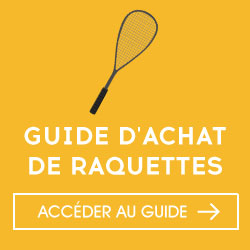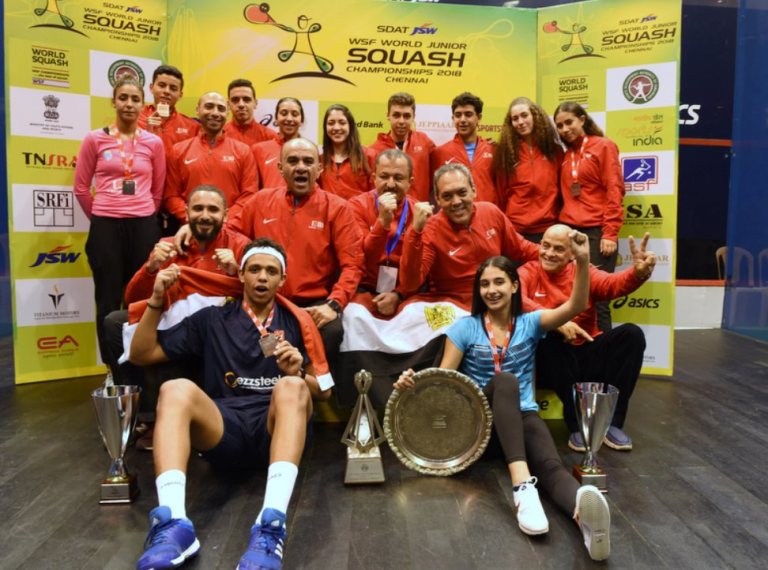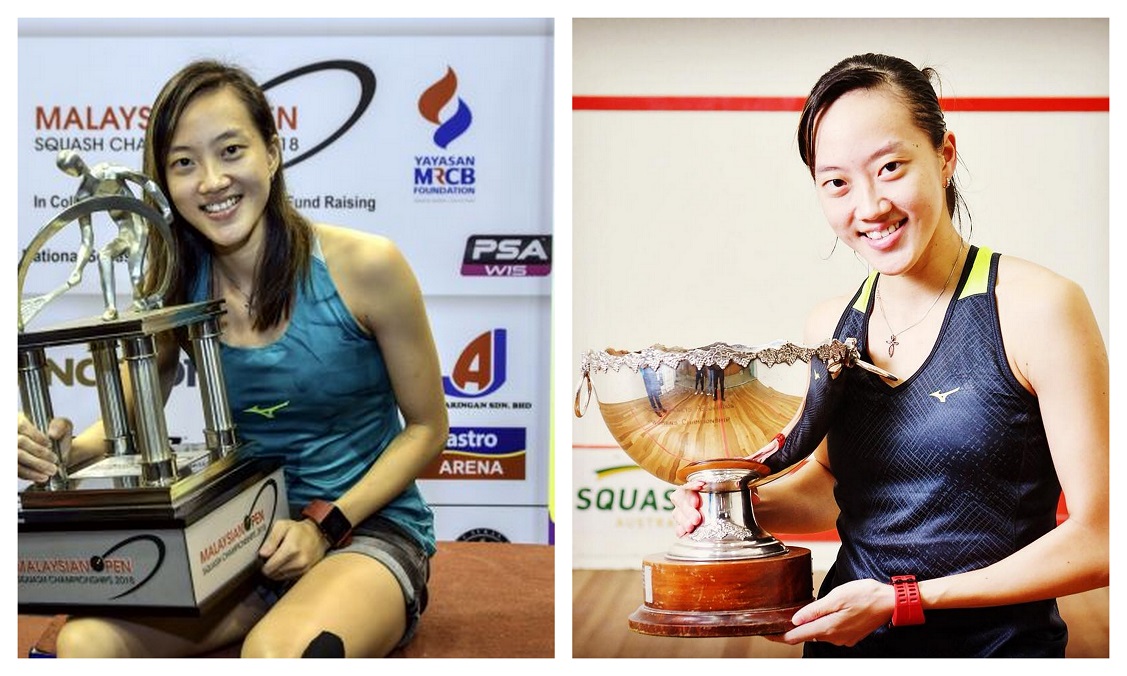World Junior Championships: Egypt complete their collection
Published :
2018-08-01 13:45:22
Categories :
Squash news around the world
Egypt did not leave the other nations much chance to shine at the World Junior Championships in India (Photo credit: #WorldJuniors2018)
Main story: It's all about Egypt at the World Juniors
Unsurprisingly, Egypt dominated the World Junior Championships in India a few days ago. Rowan Reda Araby kept her title while Mostafa Asal confirmed his meteoric rise to dethrone Marwan Tarek and the boys went on to win the team event without dropping a game. The Pharaohs are more than ever the powerhouse of squash.
Squash history is filled with dynasties, and several countries (Australia, Pakistan, England) dominated the sport in their time. But never one of them were at a given time holding the eight major world titles (men's and women's, individuals and teams, senior and juniors). Egypt have achieved this extraordinary feat after their boys won the World Junior Team Championship in Chennai, India, a few days ago. This triumph was very much expected from a group including the four semi-finalists of the individual event, but the young Pharaohs managed to live up to that status. “We’re so proud and happy,” said Egyptian coach Ahmed Matany (Source: WSF World Juniors). “The boys have worked so hard for this and they’ve got their reward, bringing Egypt another treble, just like the girls last year (author's note: in 2017, they'd already won the two individual titles as well as the girls team event). This generation has taken over from those recent generations that have done the country so proud, and they have the talent and the desire to dominate the senior ranks in the coming years." Back in the final for the first time since 2002 (the last eight finals were Egypt v Pakistan clashes), England certainly gave them their sternest challenge of the tournament. First up was Marwan Tarek - who had lost the decider in Poland two years ago - against Nick Wall, England’s only quarter-finalist here. But the Englishman played well to stay with Tarek all through the first, and the Eyptian’s reaction when he took the lead was indicative if both how much he wanted the win, and how tough that 17-minute game was. Tarek was always ahead, but never comfortably, through the next two games, kneeling to kiss the floor as he gave his team the lead. In the second match Sam Todd - only aged 15!- threatened to give England a lifeline as he matched Omar El Torkey all the way, earning game balls at 10-9 and 11-10. Egypt’s bronze medalist held his nerve to take the lead, and never looked back as he took the next two game comfortably give Egypt the title – a record sixth. World champion Mostafa Asal - who did not lose a game in his two weeks in India - did not need to go onto court. The other headline of the team event was Czech Republic's bronze medal, for their second participation! After skipping the individual event, the young Czech players ousted seed 4 Malaysia in the quarters before losing to future champions. They shared the 3rd place with USA, who finished on the same spot two years ago but came back from the brink this time: in the quarters, Canada's Julien Gosset got injured while he was 2-1 10-6 up (after his country had won the first match). Sadly, these championships ended on a tragic note, with the death of South African coach Graham Prior a few minutes after his team's last fixture. The 67-year old suffered a severe heart attack and was pronounced dead shortly afterwards, leaving the squash world in shock.
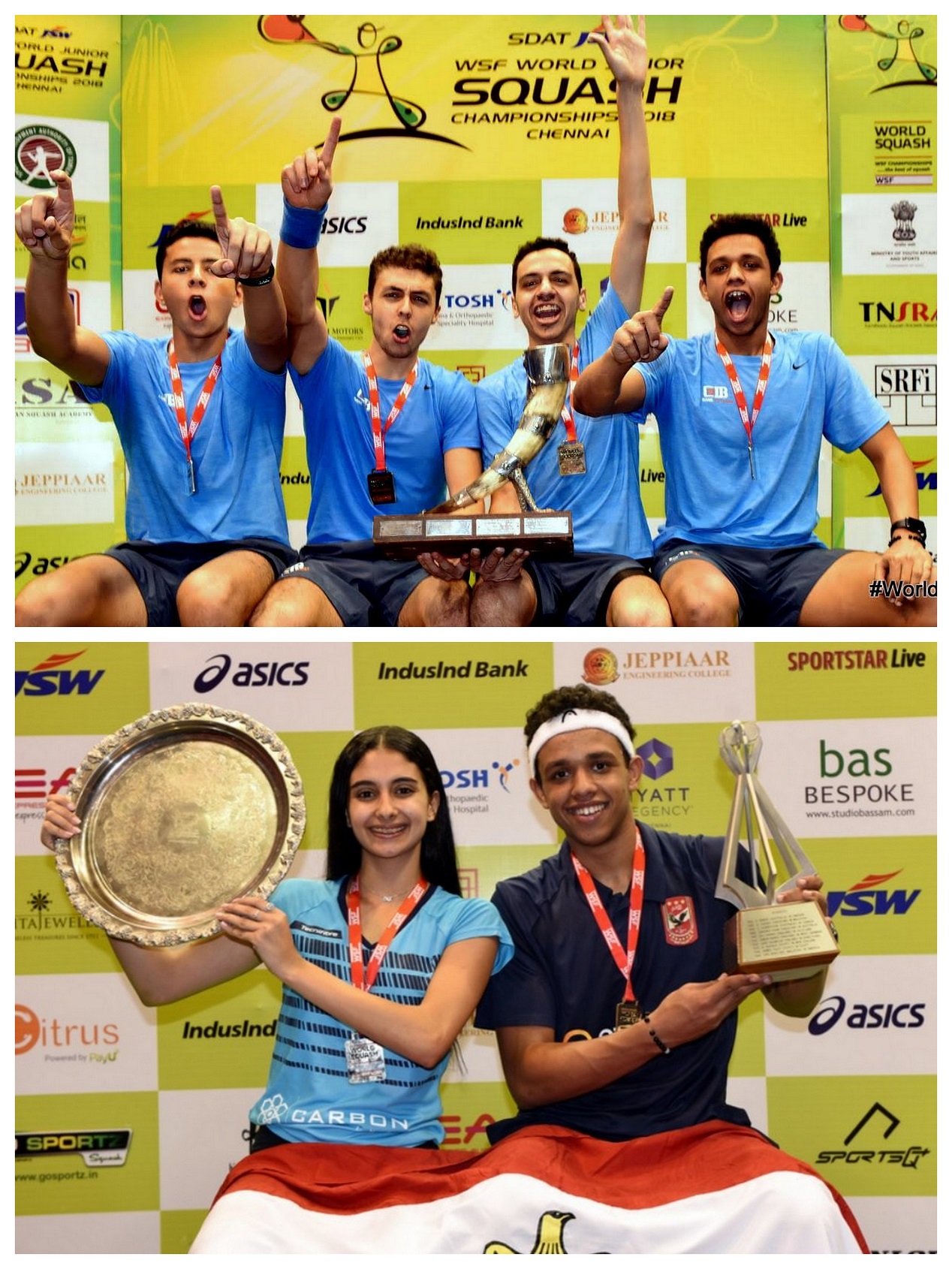
A few days after Rowan Reda and Mostafa Asal (picture below) won the individual titles, Egypt unsurprinsgly triumphed in the boys' team event (Photo credits: #WorldJuniors2018)
Although he was seeded 2, and aged only 17, Mostafa Asal was considered by many as the favorite of the boy's individual tournament. Winner of the U17 British Junior Open in January, the Cairo-born has made an incredible debut on the PSA World Tour, with a series of titles in South America which propelled him to 71 in the rankings. Besides, his main rival and defending champion Marwan Tarek had a gruelling 92-minute battle in the semis against Omar El Torkey, while Asal had not dropped a single game to reach the final. The turning point was the second game: after Asal won the first (11-7), Tarek saved three game balls and got one of his own, but Asal won the tie-break and never looked back. Next year, he'll have the opportunity to achieve what his opponent failed to: to become the fifth player to defend the world junior title after Ramy Ashour, the Shorbagy brothers and Diego Elias. Rowan Reda Araby managed to achieve the double in the girls' event, following the footsteps of fellow Egyptians Nouran Gohar, Nour El Sherbini and Raneem El Welily, as well as Nicol David's. Like last year, she beat Hania El Hammamy, who is higher ranked in the senior tour but lost for the third time in a row against her big rival. El Hammamy believed she could turn the tables after saving four match balls in the third, but Reda only needed one opportunity to close the match (11-9) in the fourth. Hammamy's only consolation is that she will have another chance to finally put her hands on the trophy next year, while Reda won't be able to make history and become the first female player to be crowned three times consecutively: she will turn 19 years old on the 29th of July, which will be the opening day of the tournament!
Other squash news in July
--- Low returns to PSA World Tour on a high (Source : PSA World Tour)
2018 has been a year of comebacks on the women's tour. After Amanda Sobhy, who quickly showed some very good form 10 months after rupturing her Achilles, former World No.5 Low Wee Wern made a stunning return in July, winning her first two tournaments after a 20-month absence! Her last appearance was at the 2016 U.S. Open, after which she had a series of surgeries on her knee. “It feels a bit surreal to be honest,” said Low on the PSA World Tour website after her first win in her home country, Malaysia. “I wasn’t sure how the body and knee would react after not competing for such a long period. 10 days prior to the Malaysian Open, I played the Malaysian Nationals and I was really struggling with my squash. The rules have changed a bit and when I was still actively playing at the top level, it was on the 19inch tin." She says she was determined to come back despite so many people questioning her ability to do so. "I was at my best prior to my first surgery in 2015 and I have just made it to top five a few months before. Having to go through one surgery was bad enough but I ended up needing three surgeries in total! Many have asked me why I am still making a comeback and not move on to something new. My answer is that I still have goals to achieve but it’s no longer just about me, if I decide to walk away now, I am giving up on the people who supported me since my junior days, my family, my coach and my sponsors. They have been by my side throughout all three of my surgeries and I owe it to them to make it back out there. I am quite fortunate that all my surgery and rehabilitation costs are covered by Malaysia. I couldn’t compete for 20 months so that means 20 months without any prize money! I’ve lost some sponsors along the way, but I am very grateful to those who stuck by me even when I couldn’t play." She also admitted that the rehabilitation process has been a long and demanding one. “It’s been challenging to say the least. I started off without being able to walk on my own. Six weeks in a knee brace and crutches before I could put weight on my knee, followed by learning to walk on my own again. Just when I was getting comfortable with walking, I was due for my follow up surgery which simply means back on the knee brace and crutches all over again! Not to mention as squash players, we have to be fairly fit and I could not run at all for close to nine months! Not running for nine weeks would affect my fitness, so can you imagine me not being able to run in a straight line at a slow speed for 9 months? So, the rehab process was extremely long and sometimes frustrating, but I knew it had to be done in order to get back on court again. There is always light at the end of tunnel and I had to persevere through it.” Both in Malaysia and in Tasmania (where she beat tour veteran Rachael Grinham in the final), Low had to go through qualifying, which means she won 11 matches in the space of 12 days, while celebrating her 28th birthday. As a result, her ranking has improved to 254th to 70th, and she will continue her rise if she carries the momentum forward this week at the Australian Open. Later in August, she will be featuring in the Asian Games with Malaysia, but only in the team event: choice was made after the Malaysian Nationals and youngster Sivasangari Subramaniam - who won the competition - was picked to play alongside Nicol David.
Malaysia's Low Wee Wern made an incredible comeback on the world tour, winning back-to-back titles (Photo credits: Squash Racquets Association of Malaysia / Wedding)
--- August World Rankings
As expected, there have been very few changes at the top of the new squash world rankings, published yesterday. Mohamed ElShorbagy has overtaken the legendary Amr Shabana to become the longest-reigning Egyptian World No.1, having held the spot for 34 months overall. Control and power: Mohamed Elshorbagy uses the squash racket Tecnifibre Carboflex 125 X speed, available at My Squash. The top 20 is unchanged with the exception of the No.20 position, Australia’s Cameron Pilley leapfrogging Hong Kong’s Leo Au to return to the top 20 after a three-month absence. Malaysian Open's runner-up Tsz Fung Yip and winner Abdulla Al Tamimi reached their highest rank, at 25th and 28th respectively. The biggest movers within the top 100 are Angus Gillams and Tayyab Aslam, who won a 10k event in July and are up 24 places (69th an 71st). In the women's, Nour El Sherbini has topped the rankings for a 28th successive month as she heads up an unchanged top 20. Meanwhile, Malaysia’s former World No.5 Low Wee Wern was the biggest mover on the women’s tour after a sensational comeback from injury that saw her win two titles in July (read above). Low captured the Malaysian Open title three days before her 28th birthday in July and followed that up with victory at the Tasmanian Open a week later to ensure that she has moved up 184 places to No.70 on the World Rankings.
Source: PSA World Tour
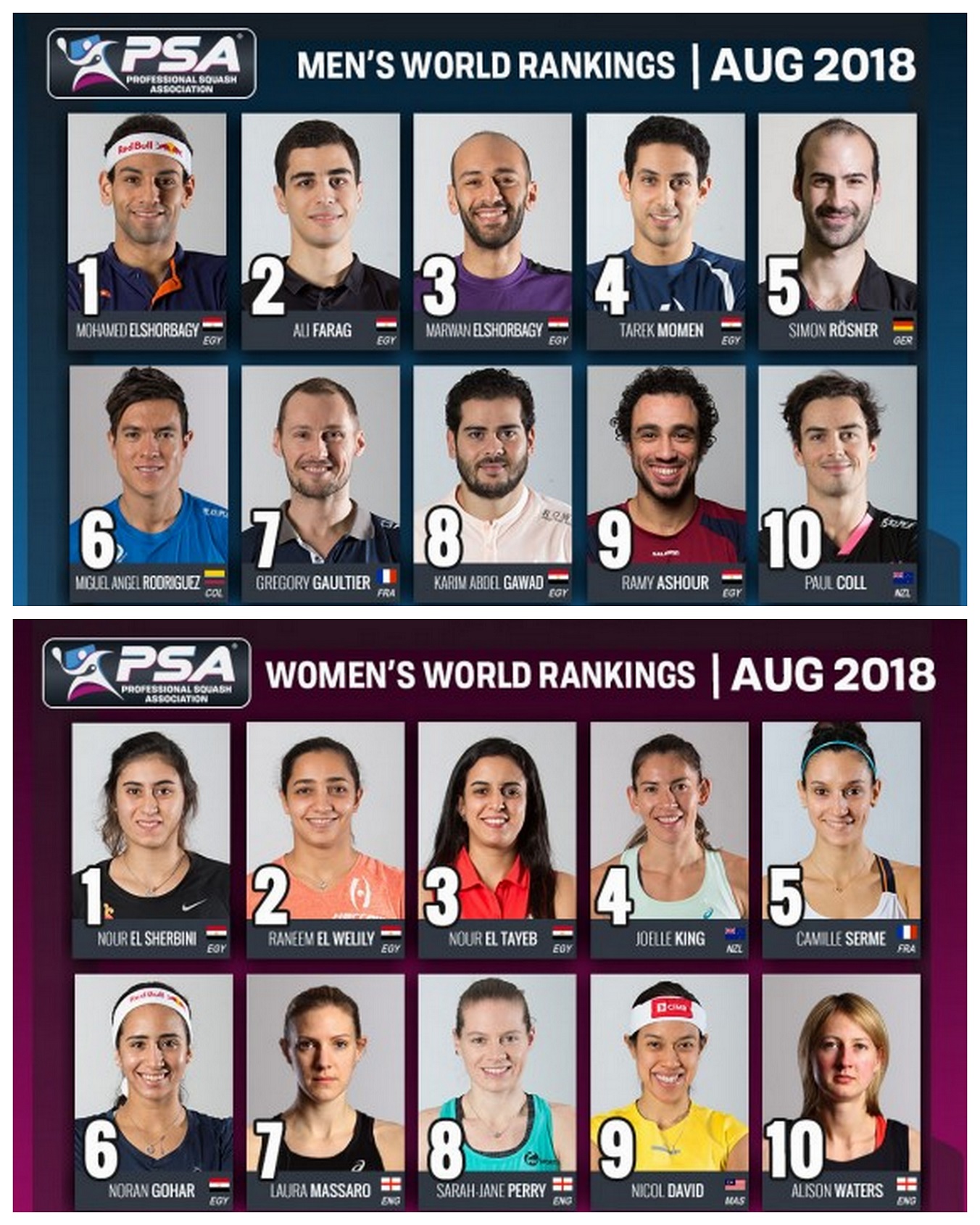
August PSA World rankings (Photo credits: PSA World Tour)
In a nutshell
--- SquashFORWARD – the joint initiative between the World Squash Federation (WSF) and Professional Squash Association (PSA), see last month's blog – officially kicked off its first activity in mid-July, with juniors from all four corners of the globe taking part in a series of brainstorming sessions during the Dutch Junior Open in Amsterdam. SquashFORWARD has been formed with the goal of engaging with the next generation of players in order to give them the chance to help shape the future of the sport, and the initiative will help make squash even more innovative, inclusive and sustainable.
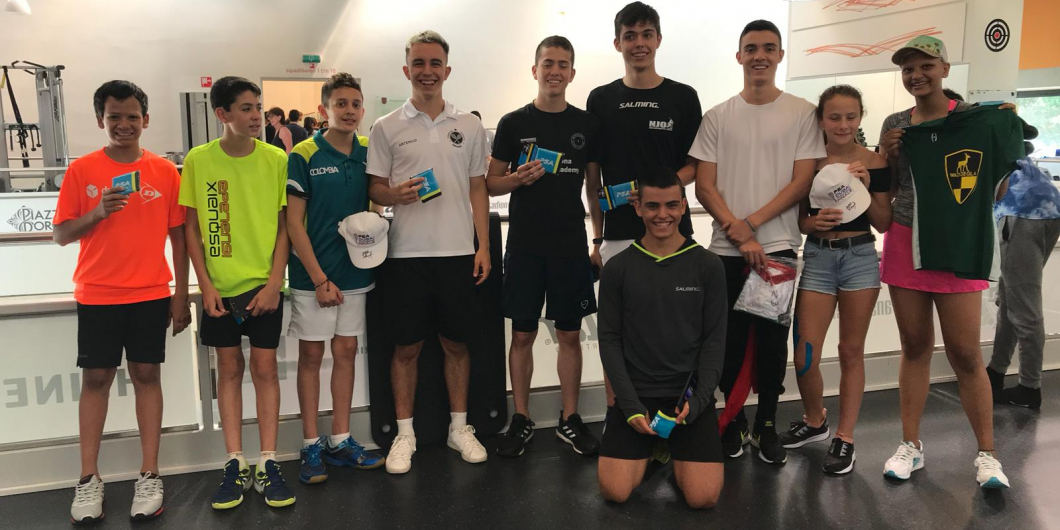
Young players from around the world attended the SquashFORWARD brainstorming sessions in Amsterdam (Photo credit: PSA World Tour)
--- On the 23rd of July, the PSA today announced that a record level of prize money was available in its World Tour during the 2017/18 season, with total financial compensation reaching $6.4 million – an 11% increase on the previous season. The pay gap between female and male players dropped by almost a third last season, with total prize money on the women’s tour totalling $2,599,000 million – a 31% increase compared to 2016/17 – while the men’s has increased to $3,820,000. The prize money was split across 227 events (146 men and 81 women) in a total of 47 countries, while tournaments were staged in eight new countries during the 2017/18 season: Bermuda, Bolivia, Brazil, British Virgin Islands, Kuwait, Nigeria, Romania and Saudi Arabia. “Squash has been through a period of unprecedented growth over the past decade and we are delighted that we can back that up with these record figures,” said PSA Chief Commercial Officer Tommy Berden.
--- The World Squash Federation (WSF) and the Professional Squash Association (PSA) jointly welcomed the announcement made by the International Olympic Committee (IOC) on the 18th of July regarding the new sports selection procedure for the Paris 2024 Olympic Games at the IOC Executive Board Meeting in Lausanne. WSF President Jacques Fontaine and PSA Chief Executive Alex Gough commented: “The whole sport is truly united in our desire to participate in the selection process and to show the strong attributes that squash can bring to the IOC and to Paris 2024 in the context of the on-going New Norm and Agenda 2020 reforms. We are preparing for the Buenos Aires 2018 Youth Olympic Games, where squash will be participating as a showcase sport. We are looking forward to giving the Olympic family first-hand experience of what our sport offers."
--- Six years before the 2024 Olympic Games, Paris will host the 10th Gay Games - and its 10,000 participants from almost 100 countries - from 4th to 12th of August. Squash will be one of the 36 featuring sports, with over 100 players gathered at Stade Charlety. Worldwide sport and cultural event that promotes sexual diversity, the Gay Games were founded as the Gay Olympics and started in 1982 in the United States in San Francisco by Olympic decathlete and medical doctor Tom Waddell. The games are open to all who wish to participate, without regard to sexual orientation, and there are no qualifying standards.
August squash hotspots
--- The 2018 WSF World Masters Squash Championships are currently underway in Charlottesville. The 15th edition of the biennial championships is the first one held in the USA and gathers 780 athletes from a record 63 nations - categories ranging from Over-35 to Over-80. A few former stars of the world tour are featuring, including Aussie Sarah Fitz-Gerald: the 5-time world champion should win a third successive Women's O45 title. Also a former World No.1, American Natalie Grainger - UK-born and South Africa-raised - is seeded to win the O40 event. In the men's, the O35 event promised to be fiercely contested with three former members of the top 12: Wael El Hindi, Laurens Jan Anjema and Alister Walker. Finals will take place on Saturday at the McArthur Squash Center at the Boar's Head Sports Club.
Meanwhile, the PSA new tour structure has come to effect yesterday, with the Australian Open becoming the first tournament to be held in this new era for professional squash. Its goal is to establish a new and exciting image for the PSA World Tour. The event in Melbourne is part of the new PSA Challenger Tour, launched to create a strong identity for lower-tier tournaments, and which will feature aspiring youngsters working their way up the PSA World Rankings.
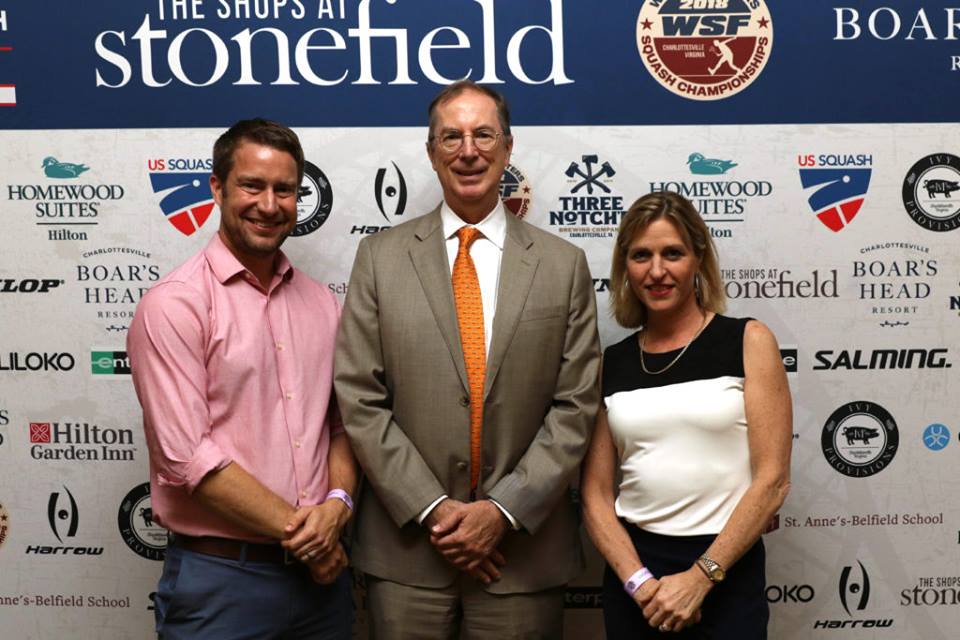
Sarah Fitz-Gerald - on the right, with representatives from US SQUASH and the University of Virginia Foundation - is one of the stars of the World Masters (Photo credit: World Masters Squash 2018)
The European Individual Championships will take place at the end of the month in Austria. In the men's draw, Grégory Gaultier, Simon Rösner and title holder James Willstrop are not featuring and the competition will therefore be very open between 2017 winner Borja Golan - who hasn't played since May because of a knee injury - Mathieu Castagnet, Nicolas Müller and Raphael Kandra. Same story in the women's draw: Camille Serme, who had won the last 6 editions, has opted not to play and a new European champion will be crowned. Among the contenders, there are last year's runner-up Millie Tomlinson, the Gilis' sisters and Serme's fellow Frenchwoman Coline Aumard.
Main resultsPSA
Winners: Abdulla Al Tamimi (Qatar) and Low Wee Wern (Malaysia) Others
Winners: Mostafa Asal (Egypt) and Rowan Reda Araby (Egypt)
Winner: Egypt ScheduleOthers
|

